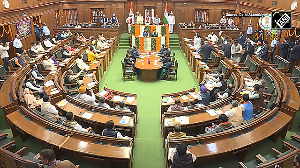There have been several occasions when workers have raised an industrial dispute with employers demanding compensation for being retrenched due to continued illness
 In a first, employers will have to pay compensation to workers who would be retrenched due to prolonged illness, the Union labour ministry has proposed in the revised draft of the industrial relations Bill.
In a first, employers will have to pay compensation to workers who would be retrenched due to prolonged illness, the Union labour ministry has proposed in the revised draft of the industrial relations Bill.
However, in a move that might face resistance from unions, the Centre has further tightened the norms to form trade unions. Even workers in the unorganised sector will have to follow the rules followed by the organised sector to form trade unions.
According to the proposal, employers will need to pay 45 days of a worker’s salary for every year worked as compensation in case he/she is retrenched, up from salary of 15 days per year worked to be given at present. This package will also be applicable to a worker retrenched due to prolonged illness.
At present, employers can retrench workers “on ground of continued ill-health” without giving a one month notice or compensation, which is mandatory in other cases according to the Industrial Disputes Act 1947.
There have been several occasions when workers have raised an industrial dispute with employers demanding compensation for being retrenched due to continued illness.
However, forming a trade union might be difficult. In factories with up to 70 workers, seven workers can form a trade union and in factories with more than 70 workers, at least 10 per cent workers can file an application to form a trade union.
The proposal says the trade unions will have to meet this eligibility norm even after the registration process is complete. This has now been proposed to be extended to unorganised workers where there is no prerequisite criteria to form a union at present.
"A trade union will have to meet the eligibility criteria not only at the time of registration but also after the registration is complete. If at any point of time, the union has less than the required mandatory numbers, the registration will be cancelled,” said a senior labour ministry official.
Union Labour Minister Bandaru Dattatreya will discuss the revised draft with trade union leaders and industry representatives on October 6. Three laws – Industrial Disputes Act, Trade Union Act and Industrial Employment (Standing Orders) Act – will be clubbed to form a labour law code on industrial relations. One of the major proposals is easing retrenchment rules for employers.
The government had proposed any factory with 300 workers can retrench without its prior permission, up from the present requirement of a factory with 100 workers. The unions had registered strong protest against many such provisions and the Union government had to form a sub-committee to discuss the proposals in detail.
The labour ministry has now proposed a slew of other measures to quell concerns of the trade unions.
A worker re-skilling fund is proposed to be set up by the central government to skill retrenched workers. According to a provision in the draft Bill, employers will contribute 30 days wage of every retrenched worker “immediately before the retrenchment”.
This fund will be utilised for the re-skilling of the workers affected by the retrenchment or closure. This means a factory owner will spend at least two months income to compensate retrenchment of an employee working in the factory for over a year.
Workers will find it easier to negotiate with employers in case an industrial dispute arises, as a trade union with majority membership strength in a factory will be treated as the sole negotiating agent for a period of four years. At present, managements refuse to recognise small or regional trade unions as bargaining agent as there is no legal obligation on them to do so. This assumes significance in factories with multiple trade unions. According to the proposal, if there are two trade unions in a factory, the one with more than 50 per cent workers as its members will be recognised as the negotiating agent. In case of no majority, the union with the highest membership will be the agent.
For quick redressal of industrial disputes, the government has proposed a tri-partite board to be known as industrial relations Board with adjudication powers, to help workers raise grievance if the conciliation process fails. Adjudication is a legal way to expedite the delivery of resolutions or punishments to conflicting parties.
At present, in case of retrenchment or dismissal or termination of service, a worker can raise a dispute before a conciliation officer. In case that fails, a report is sent to the government and after due consideration, the ministry of labour refers the dispute for adjudication to the industrial tribunals-cum-labour courts.
According to the proposal, in case of strike or lockout, the conciliation officer might forward the case to this Board within three days of failure of conciliation. After hearing the concerned employer and workers, the Board will dispose of the reference, by an interim order, “giving the amicable solution of the issues as it thinks fit within 30 days” of receiving the reference.
“This will help reduce the burden of the labour law courts as an immediate solution will be provided to both the parties. This will also help in smooth functioning of a factory as workers will not go on strike,” said the official quoted above.
A strike notice will be valid for two months instead of six weeks at present, according to another proposal. Workers in all factories will have to necessarily provide a notice of at least two weeks to the employer before going on a strike. At present, only workers in public utilities are required to issue a notice to employers before declaring a strike.
The employers will not be required to serve a 21-day notice to workers, as mandatory at present, before changing their shift timings. For the first time, the government has defined “go-slow” in the labour laws. It will be termed as “an occasion when more than one worker in an establishment conjointly work more slowly and with less effort than usual to try to persuade the employer of the establishment to agree to higher pay or better working condition”.








 © 2025
© 2025